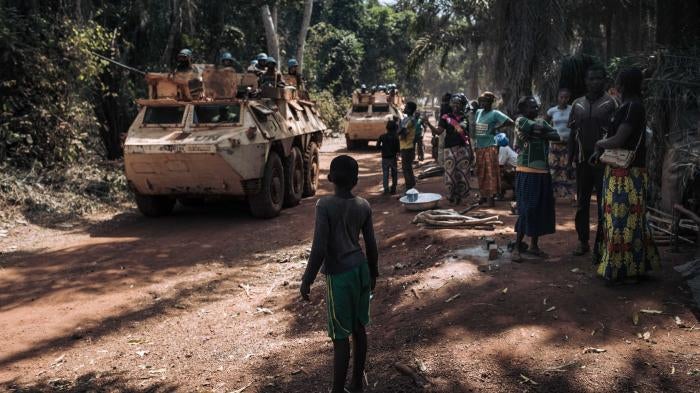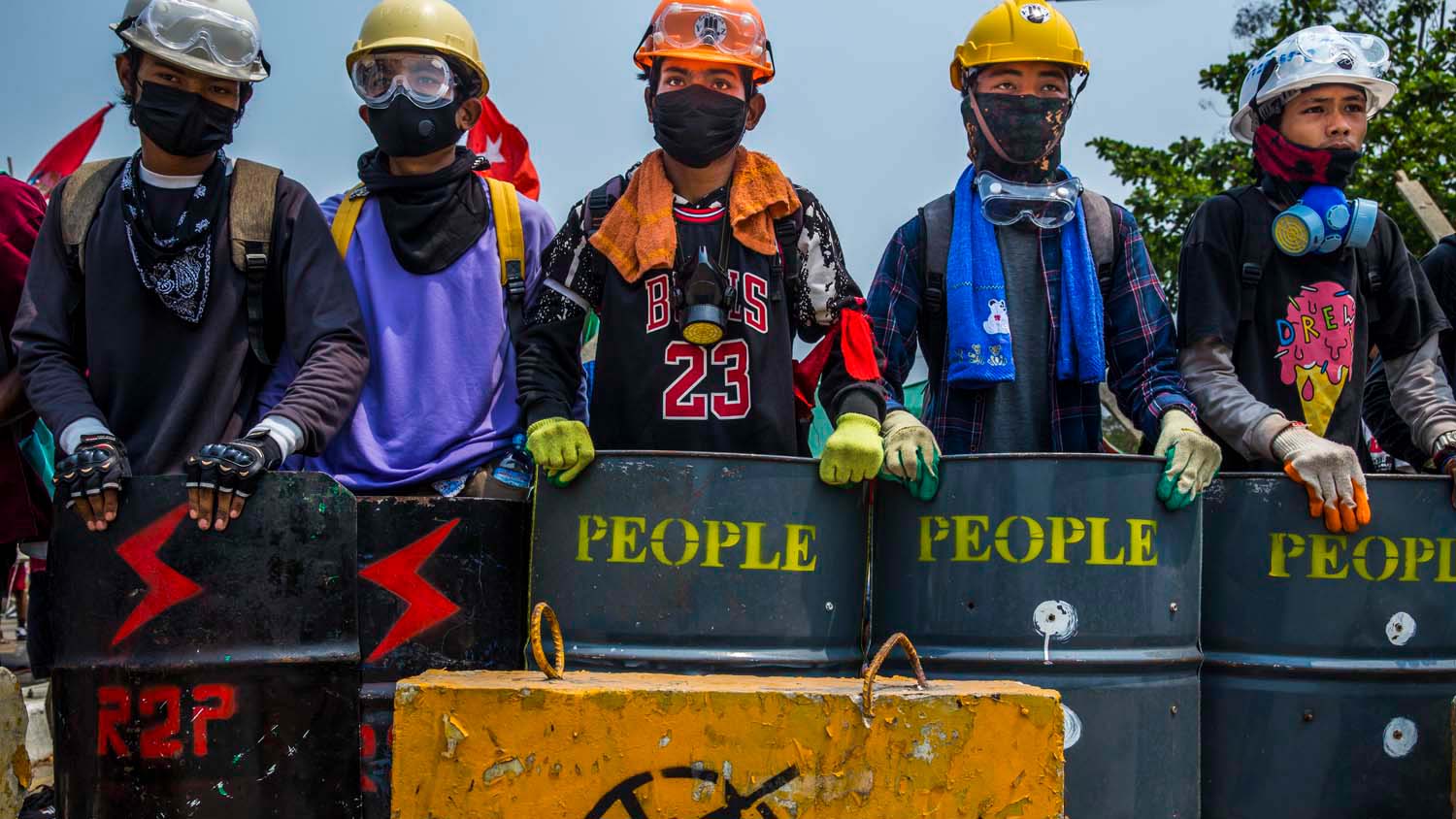Violence involving attacks on civilians continued across the country as government forces, with support from the Rwandan military and Russian mercenaries, fought the remnants of a rebel coalition that controls significant parts of the country. The Coalition of Patriots for Change (Coalition des patriotes pour le changement, CPC) attacked major towns in late 2020, preventing hundreds of thousands of people from voting in the December 27 presidential election won by President Faustin Archange Touadéra. Legislative elections, held in March, were more successful with only some parts of the country experiencing violence due to the counteroffensive against the CPC.
A January 13 CPC offensive on the capital, Bangui, was thwarted, and the city remained relatively stable. Much of the countryside, especially the northwest and the east, remained contested territory, with civilians often caught between the rebels and the government forces with their foreign allies.
Groups allied to the CPC, notably the Union for Peace in the Central African Republic (UPC) in the east and 3R in the northwest, committed widespread abuses, including deliberately targeting civilians. Credible reports, including from the United Nations, indicated that security forces and Russian mercenaries also committed serious human rights abuses. On July 21, unidentified assailants carried out an attack in Ouham province, outside of Bossangoa, killing at least 13 people. The government committed to investigate the crime via a special commission of inquiry.
More than 2,000 Russian mercenaries, possibly from Wagner—a mercenary outfit affiliated with Yevgeniy Prigozhin, a Russian oligarch said to be close to Russian President Vladimir Putin—are deployed in the Central African Republic. While officially in the country to serve as military instructors, the UN has documented several instances in which these mercenaries participated in active fighting and were implicated in human rights abuses and violations of international humanitarian law.
In April, Sidiki Abass, the leader of 3R, who was sanctioned by the UN and the United States, was killed in combat.
Several investigations remained pending at the Special Criminal Court (SCC), a war crimes court based in Bangui staffed by national and international judges and prosecutors. In September, the SCC announced charges against a high-ranking member of the presidential guard under former President François Bozizé. The International Criminal Court (ICC) started a trial of two anti-balaka suspects and held a confirmation of charges hearing in the case of a Seleka leader.
The country remained one of the most dangerous places in the world for humanitarians to work, with over 261 attacks on humanitarians registered between January and October.
Attacks on Civilians by Rebel Fighters
From December 15 to June 21, CPC fighters killed at least 61 civilians, according to the UN. Many of them appear to have been targeted because they participated in or were suspected of voting in the presidential election. In one case, in March, UPC fighters affiliated with the CPC in Ouaka province tied up, tortured, and killed three men before leaving their bodies on a road with electoral cards hanging around their necks, according to the UN.
Human Rights Watch also received credible reports throughout 2021 of dozens of civilians who were killed by fighters from the UPC in the Ouaka province and 3R in the Ouham Pende province. Landmines placed by 3R fighters, in an apparent attempt to ward off attacks by national forces and their foreign allies in Ouham Pende province, killed at least 20 civilians, including a worker from a Catholic mission and a humanitarian worker.
Abuses by National Forces and Foreign Allies
Members of the national army, the Forces armées centrafricaines (FACA), allegedly committed serious human rights violations including the extrajudicial executions of eight suspected CPC members in Ombella M’Poko province between late December and mid-January 2021. In the course of military operations, they also attacked civilians, occupied schools, and looted private property, according to the UN.
Human Rights Watch heard accounts from victims, witnesses, and other credible sources about human rights abuses committed by alleged Wagner mercenary fighters in the northwest and the east. In one instance, alleged Wagner fighters collaborated with troops from FACA to keep men suspected of being CPC combatants in inhuman detention conditions in Basse-Kotto province. Three former detainees from Basse-Kotto told Human Rights Watch that Wagner fighters committed extrajudicial executions of other detainees.
A Central African Republic government report published in October accused Russian trainers of committing human rights abuses.
Shrinking Political Space
Opposition leaders, including the former Interim President Catherine Samba-Panza, were forbidden from leaving the country at the beginning of the year due to “ongoing judicial investigations” into alleged links to armed groups affiliated with the CPC. A January judicial proceeding against Bozizé and other members of Bozizé’s party also loosely implicated other opposition leaders without clear justification.
Some programs on Radio Centrafrique and all radio programs that allow listeners to call in—on both state and private radio stations—were suspended by the High Communication Council during the presidential electoral period. Officially due to security concerns, the authorities restricted the movement of journalists outside Bangui throughout the year, limiting their ability to accurately report on abuses by rebels, national forces, and international forces aligned with the government.
Justice for Serious Crimes
In January, Seleka commander Mahamat Said Abdel Kani was transferred to ICC headquarters in The Hague. Said is accused of war crimes and crimes against humanity committed in Bangui in 2013. He is the first Seleka leader to face charges before the ICC. The ICC held a hearing on whether to confirm the charges in October, which will determine whether there is sufficient evidence for the case to go to trial.
In February, the ICC opened the trial in the case of anti-balaka leaders Patrice-Edouard Ngaïssona and Alfred Yékatom. The charges against both include war crimes and crimes against humanity committed between December 2013 and December 2014. Ngaïssona was arrested in France and transferred to the ICC in December 2018. Yékatom was transferred to the ICC by Central African Republic authorities in November 2018.
On September 10, the SCC announced that it had charged Eugène Ngaïkosset with crimes against humanity, but did not specify details of the charges. Ngaïkosset, a former captain in the presidential guard, led a unit that was implicated in numerous crimes, including the killing of at least dozens of civilians and the burning of thousands of homes in the country’s northwest and northeast between 2005 and 2007. He is also alleged to have committed crimes as a leader of the anti-balaka movement.
Despite some advances in terms of rendering justice, Human Rights Watch received credible accounts from victims of crimes committed by FACA or alleged Wagner members who said they were too scared to make judicial complaints.
In response to a joint report from the UN peacekeeping mission, MINUSCA, and the Office of the UN’s High Commissioner for Human Rights (OHCHR) in July, the government of the Central African Republic, which disputed some of the report’s findings on abuses by FACA forces, reiterated that it was ready to initiate judicial proceedings against perpetrators of serious crimes in order to put an end to human rights violations.
Refugees and Internally Displaced People (IDPs)
The total number of displaced people rose as a result of renewed fighting. Over 1.4 million people, according to the UN, were either refugees in neighboring countries (710,000) or internally displaced (712,000) as of September 2021. Over 233,000 people, 70,000 of whom are children, were newly internally displaced, including 131,000 who became refugees due to electoral violence. Conditions for IDPs and refugees, most of whom stay in camps, remained harsh. Assistance to IDPs was seriously hampered by attacks on humanitarians and general insecurity in the country.
About 2.8 million people, out of a population of 4.6 million, needed humanitarian assistance. The humanitarian response plan was underfunded, with a budget gap of around US$176 million as of October 2021.
Key International Actors
The UN peacekeeping mission, MINUSCA, deployed 11,938 military peacekeepers and 2,182 police across many parts of the country. Under Chapter VII of the UN Charter, the mission is authorized to take all necessary means to protect the civilian population from threat of physical violence and to “implement a mission-wide protection strategy.” In November, the UN Security Council extended the mandate of the mission for an additional year.
On September 15, the mission announced the repatriation of the 450-strong contingent from Gabon after internal investigations revealed cases of sexual exploitation and abuse of five girls. The UN Secretariat called on the Gabonese authorities to appoint a national investigator to conduct an investigation within 90 days, and launched its own investigation through the Office of Internal Oversight Services. Allegations of sexual violence and abuse against the Gabonese contingent had been made over the past several years.
In March, a group of UN experts, including those from the Working Group on the use of mercenaries, expressed concern about reports of crimes and human rights abuses attributable to fighters from Wagner, working jointly with state security forces (and in some instances, UN peacekeepers), including extrajudicial executions, torture, arbitrary detention, enforced disappearances, and forced displacement. In October, the same group of UN experts expressed concern about intimidation and violent harassment by “Russian instructors” from Wagner of civilians, including peacekeepers, journalists, aid workers, and minorities.


